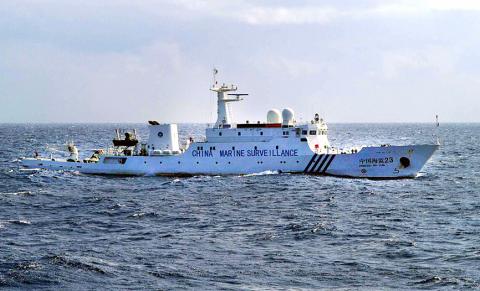|
China calls US
warning on Diaoyutais ¡¥betrayal¡¦
WAR OF WORDS: Hillary Clinton made a veiled
warning that the islands fall under the US-Japan security treaty, as three
Chinese government ships entered their waters
AFP, BEIJING and Washington

A picture taken by the Japan
Coast Guard yesterday shows a Chinese Marine Surveillance ship cruising inside
waters around the Diaoyutai Islands, known as the Senkaku Islands in Japan.
Photo: AFP / JAPAN COAST GUARD
Veiled US warnings to Beijing not to
challenge Japan¡¦s control of disputed islands encouraged Tokyo¡¦s ¡§dangerously
right-leaning¡¨ government and ¡§betrayed¡¨ Washington¡¦s vow of neutrality, Chinese
state media said yesterday.
The comments came as Japan¡¦s coastguard said three Chinese government ships had
entered Japanese territorial waters around the Diaoyutai Islands (³¨³½¥x), known as
the Senkakus in Japan.
US Secretary of State Hillary Rodham Clinton on Friday said the area around the
islands in the East China Sea was under Japan¡¦s control and therefore protected
under a US security treaty with Tokyo.
Speaking at a joint news conference with Japanese Foreign Minister Fumio Kishida
in Washington, and without mentioning Beijing directly, she said the US opposed
¡§any unilateral actions¡¨ to undermine Japanese authority over the islands.
¡§We oppose any unilateral actions that would seek to undermine Japanese
administration,¡¨ Clinton told a joint news conference with Kishida.
Clinton did not mention Beijing directly in the warning, but said: ¡§We want to
see China and Japan resolve this matter peacefully through dialogue.¡¨
¡§We do not want to see any action taken by anyone that could raise tensions or
result in miscalculation that would undermine the peace, security and economic
growth in this region,¡¨ she said.
Clinton announced that Japanese Prime Minister Shinzo Abe would visit the US
next month.
In a commentary piece, Xinhua news agency criticized Washington¡¦s position,
saying it ¡§cast doubts on [US] credibility as a responsible power in the
region.¡¨
It was ¡§unwise¡¨ for Washington ¡§to throw support behind Japan in Tokyo¡¦s islands
dispute with Beijing,¡¨ Xinhua said, adding: ¡§This unbalanced position has
betrayed its declared intention to stay neutral on the issue.¡¨
The US proposal for ¡§tighter military alliance with Japan will only encourage
Tokyo¡¦s dangerously right-leaning tendency,¡¨ Xinhua said.
Three Chinese government surveillance vessels sailed in waters around the
disputed islands yesterday for nearly five hours, but had all left Japanese
waters by 1:52pm, the Japanese coast guard said.
China has repeatedly sailed into the waters since Japan bought three islets in
the chain in September last year, a move that triggered anger and demonstrations
in China.
The US insists it is neutral on the ultimate sovereignty of the islands.
China has persistently criticized the US position and the sending of maritime
surveillance ships to the potentially gas-rich area is seen by experts as a way
to contest the notion that Japan holds effective control.
¡§The frequency and scale of their provocations have drastically increased,¡¨
Japanese foreign ministry spokesman Masaru Sato told reporters in Washington.
¡§The Chinese are trying to change the existing order by coercion or
intimidation,¡¨ he said.
Abe has been known throughout his career as a hawk on national security, but
Kishida took a measured tone on China while in Washington, describing the
relationship with Beijing as ¡§one of the most important¡¨ for Japan.
¡§While Japan will not concede and will uphold our fundamental positions that the
Senkaku Islands are an inherent territory of Japan, we intend to respond calmly
so as not to provoke China,¡¨ Kishida said.
Kishida welcomed Clinton¡¦s support, saying that the statement on the security
treaty ¡§will go against any unilateral action that would infringe upon the
administration rights of Japan.¡¨
US officials and pundits have largely welcomed the return of the Liberal
Democratic Party, believing that Abe¡¦s firm positions and pledges to boost
military spending will deter confrontational moves by Beijing.
However, Abe in the past has made controversial statements on Japan¡¦s wartime
history, leading to fears that a loose comment could set off new tensions at a
time that new leaders are also taking charge in China and South Korea.
Clinton said US officials ¡§applaud the early steps¡¨ taken by Abe and hoped that
new leaders in Japan and China would ¡§get off to a good start.¡¨
|
![]()
![]()
![]()